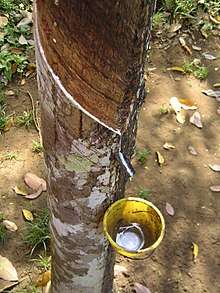latex
English

Etymology
Borrowed from New Latin latex (“clear fluid which is part of a humour or bodily fluid”), a later use of Latin latex (“water; liquid, fluid”). Potentially a borrowing from Ancient Greek λᾰ́τᾰξ (látax, “drop of wine”), reformed by analogy to other nouns in -ex. The semantic shift, however, from drop of wine to water is difficult to explain and may indicate that both words originated from a separate language. Perhaps from the same root as Proto-Celtic *lati- (Old Irish laith (“liquid, beer”), Welsh llad (“beer”)) or Proto-Germanic *ladjō- (Old High German letto (“clay, loam”), Old Norse leðja (“mud, dregs”)) or from a Pre-Greek language.[1][2][3]
Pronunciation
- (Received Pronunciation) IPA(key): /ˈleɪtɛks/
- (US) IPA(key): /ˈleɪˌtɛks/
- Hyphenation: la‧tex
Noun
latex (countable and uncountable, plural latices or latexes)
- (medicine, archaic, rare) A clear liquid believed to be a component of a humour or other bodily fluid (esp. plasma and lymph)
- The milky sap of several trees that coagulates on exposure to air; used to make rubber.
- An emulsion of rubber in water, used in adhesives and the like.
- (uncountable) Natural latex rubber, especially non-vulcanized rubber, such as is used in making latex gloves, latex condoms, and latex clothing.
Translations
|
|
References
- De Vaan, Michiel (2008), “latex”, in Etymological Dictionary of Latin and the other Italic Languages (Leiden Indo-European Etymological Dictionary Series; 7), Leiden, Boston: Brill, page 329
- Beekes, Robert S. P. (2010), “λάταξ”, in Etymological Dictionary of Greek (Leiden Indo-European Etymological Dictionary Series; 10), volume I, with the assistance of Lucien van Beek, Leiden, Boston: Brill, page 837
- Philippa, Marlies; Debrabandere, Frans; Quak, Arend; Schoonheim, Tanneke; van der Sijs, Nicoline (2003–2009), “latex”, in Etymologisch woordenboek van het Nederlands (in Dutch), Amsterdam: Amsterdam University Press
- “latex, n.”, in OED Online

French
Etymology
Borrowed from New Latin latex (“clear fluid which is part of a humour or bodily fluid”), a later use of Latin latex (“water; liquid, fluid”).
Pronunciation
- IPA(key): /la.tɛks/
References
- “latex” in le Trésor de la langue française informatisé (The Digitized Treasury of the French Language).
Latin
Etymology
Potentially a borrowing from Ancient Greek λᾰ́τᾰξ (látax, “drop of wine”), reformed by analogy to other nouns in -ex. The semantic shift, however, from drop of wine to water is difficult to explain and may indicate that both words originated from a separate language. Perhaps from the same root as Proto-Celtic *lati- (Old Irish laith (“liquid, beer”), Welsh llad (“beer”)) or Proto-Germanic *ladjō- (Old High German letto (“clay, loam”), Old Norse leðja (“mud, dregs”)) or from a Pre-Greek language.[1][2][3]
Pronunciation
- (Classical) IPA(key): /ˈla.teks/, [ˈɫa.tɛks]
- (Ecclesiastical) IPA(key): /ˈla.teks/, [ˈlaː.teks]
Noun
latex m (genitive laticis); third declension
- (Classical Latin, chiefly poetic) water
- (Classical Latin, chiefly poetic) liquid, fluid
- (Classical Latin, chiefly poetic, in the plural) springs
- (Classical Latin, chiefly poetic) juice, oil, milk
- (New Latin, medicine) A clear liquid believed to be a component of a humour or other bodily fluid (esp. plasma and lymph)
- (New Latin, botany) Milky liquid which exudes from a plant when cut and which coagulates on exposure to air.
Declension
Third declension.
| Case | Singular | Plural |
|---|---|---|
| Nominative | latex | laticēs |
| Genitive | laticis | laticum |
| Dative | laticī | laticibus |
| Accusative | laticem | laticēs |
| Ablative | latice | laticibus |
| Vocative | latex | laticēs |
Descendants
- English: latex
- Armenian: լատեքս (latekʿs)
- Catalan: làtex
- Danish: latex
- Dutch: latex
- Esperanto: laktosuko
- Finnish: lateksi
- French: latex
- Galician: látex
- German: Latex
- Ido: latexo
- Italian: latice, lattice
- Japanese: ラテックス (ratekkusu)
- Polish: lateks
- Portuguese: látice, látex
- Romanian: latex
- Russian: ла́текс (látɛks)
- Spanish: látex
- Swedish: latex
References
- latex in Charlton T. Lewis and Charles Short (1879) A Latin Dictionary, Oxford: Clarendon Press
- latex in Charlton T. Lewis (1891) An Elementary Latin Dictionary, New York: Harper & Brothers
- latex in Charles du Fresne du Cange’s Glossarium Mediæ et Infimæ Latinitatis (augmented edition, 1883–1887)
- latex in Gaffiot, Félix (1934) Dictionnaire Illustré Latin-Français, Hachette
- “latex, n.”, in OED Online

- De Vaan, Michiel (2008), “latex”, in Etymological Dictionary of Latin and the other Italic Languages (Leiden Indo-European Etymological Dictionary Series; 7), Leiden, Boston: Brill, page 329
- Beekes, Robert S. P. (2010), “λάταξ”, in Etymological Dictionary of Greek (Leiden Indo-European Etymological Dictionary Series; 10), volume I, with the assistance of Lucien van Beek, Leiden, Boston: Brill, page 837
- Philippa, Marlies; Debrabandere, Frans; Quak, Arend; Schoonheim, Tanneke; van der Sijs, Nicoline (2003–2009), “latex”, in Etymologisch woordenboek van het Nederlands (in Dutch), Amsterdam: Amsterdam University Press